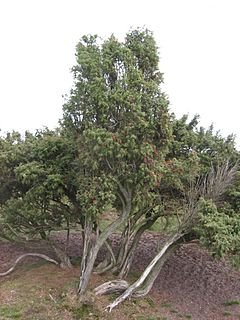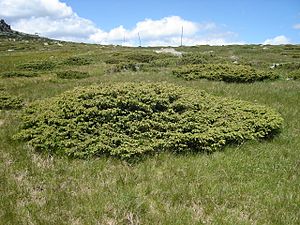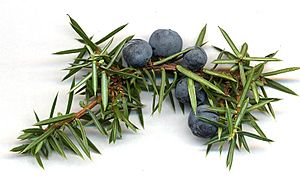Common Juniper facts for kids
Quick facts for kids Juniperus communis |
|
|---|---|
 |
|
| Juniperus communis subsp. communis in the Netherlands |
|
| Conservation status | |
| Scientific classification | |
| Kingdom: | |
| Division: | |
| Class: | |
| Order: | |
| Family: | |
| Genus: | |
| Species: |
J. communis
|
| Binomial name | |
| Juniperus communis |
|
Juniperus communis, the Common Juniper, is a species in the genus Juniperus, in the family Cupressaceae. It has the largest range of any woody plant. It is all over the cool temperate Northern Hemisphere. It can be found in North America, Europe and Asia.
Description

Juniperus communis is a shrub or small coniferous evergreen tree. It is a low spreading shrub. Sometimes it can reach 10 m tall.
The seed cones are berry-like. They are green when ripening. In 18 months they change to purple-black with a blue waxy coating.
Uses
Crafts
It is too small to be used for lumber. In Scandinavia, however, juniper wood is used for making containers. These containers store small amounts of dairy products such as butter and cheese. In Estonia juniper wood is valued for its long lasting and pleasant aroma. Various decorative items (often eating utensils) are common in most Estonian handicraft shops and households.
Culinary
Its astringent blue-black seeds, commonly known as "Juniper berries", are too bitter to eat raw. They are usually sold dried and used to flavour meats, sauces, and stuffings. They are generally crushed before use to release their flavour. The berries are used to flavour certain beers and gin. The Slovak national alcoholic beverage Borovička is also flavoured with juniper berry extract.
Traditional medicine
Juniper berries have long been used as medicine by many cultures. Juniper berries act as a strong urinary tract disinfectant if eaten. They were used by Native Americans as an herbal remedy for diabetes. Western American tribes combined the berries of Juniperus communis with Berberis root bark in a herbal tea.
Images for kids
-
Juniperus communis wood pieces, with a U.S. penny for scale, showing the narrow growth rings of the species
See also
 In Spanish: Enebro común para niños
In Spanish: Enebro común para niños










